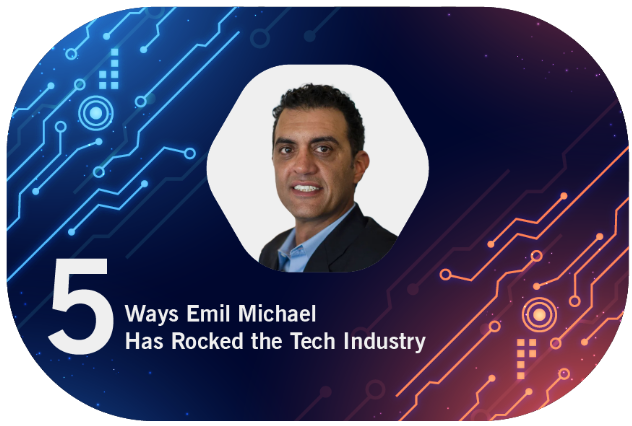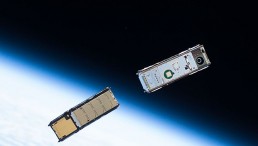Once mentored by "Trillion Dollar Coach" Bill Campbell - who was a guru to Steve Jobs and Google co-founder Larry Page - Emil Michael is no stranger to taking risks and coming out on top. With a slew of startups under his belt that have revolutionized fintech as the world knows it, the entrepreneurial wonder says he's always on the hunt for his next game-changing investment. From surrounding himself with intelligent, resilient team members to facing challenges head-on, here are five ways Emil Michael has rocked the tech industry and why all eyes are on his next major move.
1. Emil Michael built multiple highly lucrative Silicon Valley staples
He was behind Tellme Networks, which sold to Microsoft in 2007 for around $800 million, and Klout, which was snapped up by Lithium Technologies for $200 million. "At Tellme, a lot of great people we hired went on to do great things," he said during a University of Miami Patti and Allan Herbert Business School lecture. "A lot of these people are at top jobs at Google, Apple, and so on." Emil Michael began his career at Goldman Sachs but soon realized Silicon Valley seemed a lot more attractive than the buttoned-up grind of Wall Street. The Stanford Law School graduate also confesses if he could do it all over again, he would've skipped law school and headed straight into tech in 1994 instead of 1998. "Those four years were when Amazon was invented and very big business ideas were incubated," he says.
2. He raised $15 billion at Uber - the most money of any private startup in history
Emil Michael defines this as his proudest career achievement. His ambitious endeavor reframed fundraising and put Uber on top of the ride-sharing pyramid. During his time there, he fostered partnerships with Toyota, Amex, and AT&T. He says it was part art and part science. A very specific process is needed to raise such an extraordinary amount of money and it's essential to maintain a clear vision.
3. He played a key role in bringing Uber to China
In the No. 2 spot at the ride-sharing giant from 2013 to 2017, Emil Michael led expansion into China and Russia and helped generate more than $70 billion in market value creation. During his time in China, Emil Michael also saw the explosive growth of electronic payment systems and friction-free payment flow. "We wanted to make transportation as reliable as running water for everyone, everywhere," he mentioned at the University of Miami. "We did it all over the world." Spending more than 150 days in China, he says no American tech company has previously had an on-the-ground tech business of that caliber.
4. His SPAC DPCM Capital merger landed a $340 million deal after merging with D-Wave to form D-Wave Quantum Inc.
The quantum computing enthusiast says he couldn't be happier with the deal. "They can solve real-world optimization problems today given their approach," he told Bloomberg TV. Michael also tweeted on Feb. 8, "Today's a great day for quantum computing - my SPAC, DPCM, is excited to be working with @dwavesys; the only provider to build both annealing and gate-model quantum computers." According to Bloomberg TV, D-Wave will use capital from the merger to commercialize quantum computing.
5. He walked away from a potential $1.2 billion mobile gaming merger
Not every big payday is a smart long-term business move. Although Emil Michael says he believes in taking intelligent business risks, he and mobile entertainment company Jam City mutually decided a DPCM Capital merger would not come to fruition. "The reason is that the mobile gaming market fluctuated with people staying at home with COVID," he says.
The Next Big Tech Trend to Watch
Emil Michael says one of the lessons he's learned in business is to not only be focused on conquering the world but effectively building the machinery to carry that out. Michael says companies disrupting the traditional banking system is something to watch out for in the fintech space.
"Revolut is one of them," he says. "And those are the kinds of companies that are just doing incredible things and bringing banking services to the un-banked, reducing fees, just doing payday stuff that's not egregious. So people get money faster, same-day pay. And those are the companies that I think are just going to eat up the financial system."
The tech magnate is also betting on automation capability and robotics. "New technologies that are going to fast forward artificial intelligence," he predicts on the move toward self-driving cars, self-driving planes, and robots that will eventually replace jobs such as burger flipping at fast-food restaurants.
* This is a contributed article and this content does not necessarily represent the views of sciencetimes.com





![Anger Could Lead to Blood Vessel Dysfunction, Increase Risk of Heart Problems [Study]](https://1721181113.rsc.cdn77.org/data/thumbs/full/53500/89/56/50/40/anger-could-lead-to-blood-vessel-dysfunction-increase-risk-of-heart-problems-study.jpg)








![Venus Lost Water and Dried Out Due to Chemical Reaction HCO+ Dissociative Recombination [Study]](https://1721181113.rsc.cdn77.org/data/thumbs/full/53493/258/146/50/40/venus-lost-water-and-dried-out-due-to-chemical-reaction-hco-dissociative-recombination-study.jpeg)
